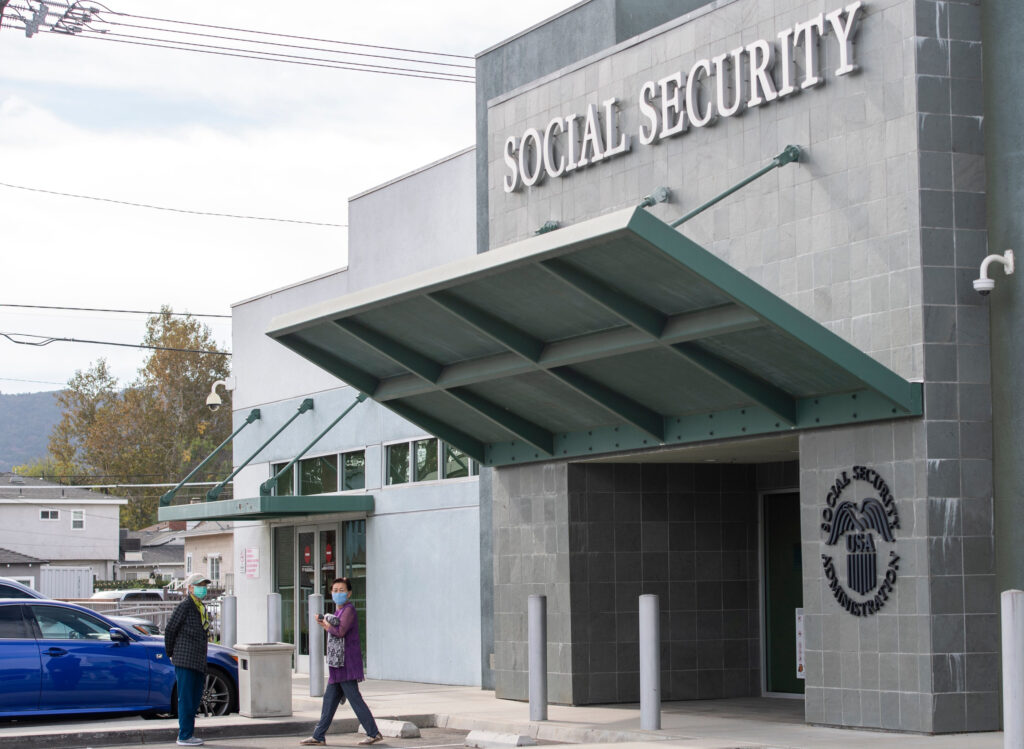Seniors could be losing nearly $400 each month in their Social Security payments, a new report from the Senior Citizens League said.
Social Security beneficiaries have long complained that their monthly benefits do not accurately account for inflation. Despite the Social Security Administration implementing a cost-of-living adjustment (COLA) each year to reflect inflation, many recipients say they have lost their buying power because of unsatisfactory increases.
A new report from the Senior Citizens League found that Social Security payments have not properly accounted for actual inflation in roughly eight of the last 15 years. The league also said that the current monthly Social Security payment is on average $370 less than what it should be. That means seniors have lost 20 percent of their buying power since 2010, based on their monthly checks.
People wearing facemasks leave a Social Security Administration building on November 5, 2020, in Burbank, California. A Senior Citizens League report found that the agency is likely underpaying beneficiaries by roughly $400 each month.
VALERIE MACON/AFP via Getty Images
“It’s always difficult to fully understand whether COLA is actually keeping up with inflation, as there are so many different organizations that have their own data and estimates pertaining to it,” Alex Beene, a financial literacy instructor for the University of Tennessee at Martin, told Newsweek.
“If this report finds they aren’t keeping up with rising costs, though, it wouldn’t be a shock to most seniors who are having trouble getting by on a budget, even if that budget includes increased payments.”
The current COLA calculation relies on the consumer price index for urban wage earners, which critics have long said does not accurately measure inflation’s impact on health care and housing. Seniors typically feel that type of inflation at a disproportionate level.
“The ever-increasing cost of health care has outpaced overall inflation, and that is likely the largest cost for seniors,” Kevin Thompson, a finance expert and founder and CEO of 9i Capital Group, told Newsweek. “Health care costs continue to outpace normal inflation and if that continues, the cost for seniors will continue to rise and their savings will continue to be depleted.”
Many seniors already rely on their Social Security checks for the bulk of their retirement income, despite the average payment bring just $1,778 per month.
Thompson said the continuing concerns over COLA not matching inflation’s impact on seniors reflects the need to invest your assets in a diversified portfolio.
“Stocks, over time, have been a good inflation hedge for investors, and having a portion of your assets inside of these kinds of investments helps offset what was lost in the form of a lackluster COLA,” Thompson said.
As the elderly population grows, with increasing numbers of Baby Boomers entering retirement, Beene said more of America’s economic activity will hinge on the purchasing power of seniors, creating further problems down the line.
“If they can’t keep up with the costs of everyday items, they’re going to be financially conservative and cut back, which won’t be good for the wider market,” Beene said.
👇Follow more 👇
👉 bdphone.com
👉 ultraactivation.com
👉 trainingreferral.com
👉 shaplafood.com
👉 bangladeshi.help
👉 www.forexdhaka.com
👉 uncommunication.com
👉 ultra-sim.com
👉 forexdhaka.com
👉 ultrafxfund.com
👉 ultractivation.com
👉 bdphoneonline.com
